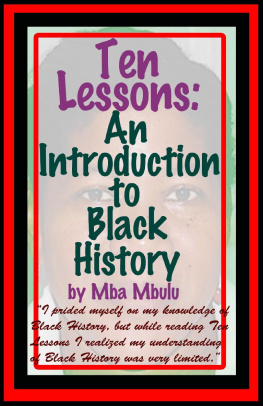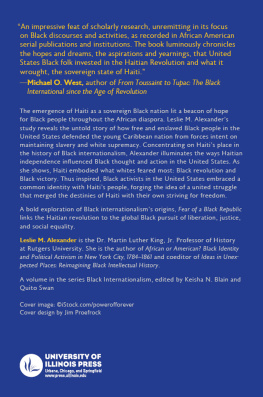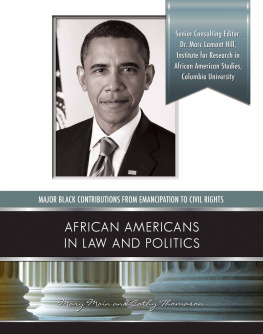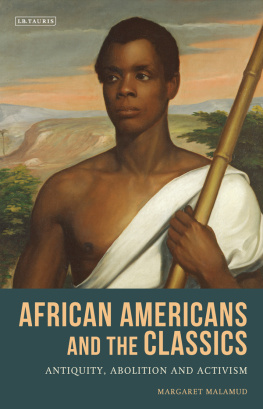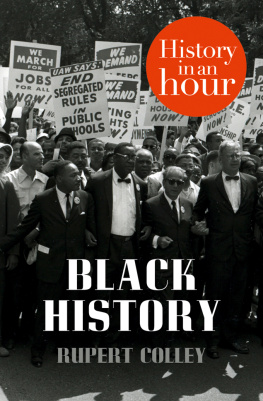TEN LESSONS:
AN INTRODUCTION TO
BLACK HISTORY
By Mba Mbulu
TEN LESSONS: AN INTRODUCTION TO
BLACK HISTORY is the exclusive property of Mba Mbulu, who retains all rights to its ownership and exploitation.
Copyright 2018, 2000, 1993, 1980, 1976 All Rights Reserved
No unauthorized duplication or transmission permitted
Take free Black Studies courses online at Aset University. Go to www.asetbooks.com
Learn what some people dont want you to know!
Another Didit of Mba Mbulu
&
SlideOver Productions
INTRODUCTION
This is a brief history of Black People. Its purpose is to give Us** an understanding of history. It is based on facts, but it does not relate all of those facts. It simply puts them all in perspective, makes them all part of a whole and gives Us a clear picture of what has been going on and continues to go on.
For the Black person who wants a solid foundation for understanding the history of Black People, I suggest the following books as reading material. These books represent a gold mine of facts and superior scholarship, but more than anything else their value is in the conceptual framework upon which they are founded and the authors' abilities to pass on this framework as they pass on the events of history. The books include:
AFRICAN ORIGIN OF CIVILIZATION Cheikh Anta Diop
BLACK RECONSTRUCTION IN AMERICA W. E. B. DuBois
INTRODUCTION TO AFRICAN CIVILIZATION John G. Jackson
THE BLACK JACOBINS C.L.R. James
STOLEN LEGACY George G.M. James
AFRICAN ORIGIN OF MAJOR WESTERN RELIGIONS Yosef ben-Jochannan
BLACK MAN OF THE NILE Yosef ben-Jochannan
THE DESTRUCTION OF BLACK CIVILIZATION Chancellor Williams
**Throughout this Handbook [10 LESSONS] the term Black People and all terms that refer to all of Us are capitalized. This is because Black philosophy is a philosophy of the group as opposed to a philosophy of the individual. To Us, the group, the Race, is supreme; Its identification and survival are of major concern and consideration. Therefore, whatever is referred to It is capitalized. This is in contrast to the philosophy of white people, which stresses the individual and capitalizes terms that refer to the individual ("I"), while failing to capitalize terms that refer to the group. The difference in this particular aspect of philosophy indicates how basic the differences are between Black People and white people.
Additionally, there is a difference between the adjective black and the proper noun Black. Whenever the term is used to refer to a person or people, it is a proper noun and should be capitalized. For that same reason, whenever Black and people are used together, both should be capitalized. As such, We obligate the language to give Us Our proper respect.
EDITOR'S NOTE
All of the traditional books that stated that Columbus discovered America were "scholarly" works, complete with footnotes and bibliography. But Columbus did not discover America. All of the highly acclaimed books that said Abraham Lincoln freed the slaves were "scholarly" works, complete with footnotes and bibliography. But Lincoln did not free the slaves. All of the cherished books that said Black People were inferior to white people were "scholarly" works, complete with footnotes and bibliography. But Black People have never been inferior to white people. All of the most read books that declared Egypt was not a part of Black Africa were "scholarly" works, complete with footnotes and bibliography. But Egypt has always been part of Black Africa. We could continue to cite examples endlessly. The point is this: Research and honesty, not footnotes and bibliographies, are the real bases of scholarship. Don't play the fool!
TEN LESSONS: Preface 2000 Edition
TEN LESSONS: AN INTRODUCTION TO BLACK HISTORY, a Black history book that specifically addresses developments in Africa, the Caribbean, North America, South America and Europe, was initially written in the mid to late 1970s. Final touches were made in 1980. Since that time, no changes have been made except those that appear in this edition; namely, the substitution of Native Americans for Indians, the addition of an abbreviated index and a few grammatical adjustments. As such, this book, as originally written, was the first history book (to my knowledge) to categorically state that white people evolved from Black People, that by 1700 white America was what white America was to become, and that the distinct character of all of the European colonies was determined not by religion or economics but by whether or not the white colonizers planned to make a particular colony their new home. TEN LESSONS also exposed the myths of white unity and white efficiency, and placed the burden of Our development on Us, Black People. But that is only a small portion of the power of this book. TEN LESSONS not only predicted the fall of apartheid in South Africa but the propping up of a stooge Black leadership there, the emergence of a new world order that Black People would be at the center of yet unprepared for, the still impending rebound in the clash for control of North Africa between Africans and Arabs, and the plans by white people to conduct a third world war, a fight over Africa in complete disregard for the rights of Black People throughout the world that will, unbeknownst to white people, spell the end of white world domination. I could write what I wrote because I write for the well-being of Black People. I am not controlled by personal, economic or white-centric interests, I have nothing to gain by misinforming anybody and I am so well founded in what I recognize that I trust taking a direction that others either scorn (for whatever reasons) or lack the acuity to perceive. Under different circumstances one might accuse me of bragging, but the evidence and facts speak for themselves. My understanding of history, past, present and future, is such that I feel secure when I explain to Black People what has happened, what is happening, and what is likely to happen. My foundation is time tested. I am not only secure enough to make the prediction, I dare the prediction to not materialize!
Why? Because I am not predicting at all, I am simply interpreting evidence that the past, present and future have left behind. Just as any child can tell you what s/he just saw on the television, any capable historian can tell you what the past, present and future have revealed to him or her.
TEN LESSONS is an authentic history book, and future books on Black History will model themselves after elements that come together in a unique fashion in TEN LESSONS. Why do I say this? Simply because history is that scholarly pursuit, that educational discipline, that encompasses the past, present and future. History is made, yet history makes. Clever groups of individuals have made and continue to make history by forging into the future and determining how events will unfold. Their determinations await the arrival of less aware groups of people, who habitually march into already unfolded conditions and resign themselves to adjusting to those conditions. These groups of people, the latter group, let history make them; they have never been competitive and will never be so until they recognize and give priority to the futuristic substance of history, particularly Black History.
Black People must begin to realize that history is the molding of the future. Certainly, history is a recognition of the past, but one recognizes the past primarily to gain an understanding of how to mold the future. We live in a world dominated by high technology, where information starts arriving at its point of destination before it has completely left its point of origin. To compete effectively in such a world, We have to literally live in the future, make history there and, above all, make sure that We are not in a position whereby history can make Us.
Next page
